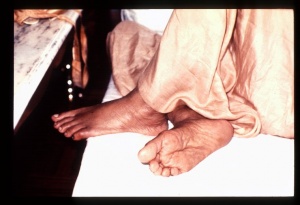CC Madhya 20.137 (1975): Difference between revisions
(Vanibot #0027: CCMirror - Mirror CC's 1996 edition to form a basis for 1975) |
(Vanibot #0020: VersionCompareLinker - added a link to the Version Compare feature) |
||
| Line 2: | Line 2: | ||
<div style="float:left">'''[[Sri Caitanya-caritamrta (1975)|Śrī Caitanya-caritāmṛta (1975)]] - [[CC Madhya (1975)|Madhya-līlā]] - [[CC Madhya 20 (1975)|Chapter 20: Lord Śrī Caitanya Mahāprabhu Instructs Sanātana Gosvāmī in the Science of the Absolute Truth]]'''</div> | <div style="float:left">'''[[Sri Caitanya-caritamrta (1975)|Śrī Caitanya-caritāmṛta (1975)]] - [[CC Madhya (1975)|Madhya-līlā]] - [[CC Madhya 20 (1975)|Chapter 20: Lord Śrī Caitanya Mahāprabhu Instructs Sanātana Gosvāmī in the Science of the Absolute Truth]]'''</div> | ||
<div style="float:right">[[File:Go-previous.png|link=CC Madhya 20.136 (1975)|Madhya-līlā 20.136]] '''[[CC Madhya 20.136 (1975)|Madhya-līlā 20.136]] - [[CC Madhya 20.138 (1975)|Madhya-līlā 20.138]]''' [[File:Go-next.png|link=CC Madhya 20.138 (1975)|Madhya-līlā 20.138]]</div> | <div style="float:right">[[File:Go-previous.png|link=CC Madhya 20.136 (1975)|Madhya-līlā 20.136]] '''[[CC Madhya 20.136 (1975)|Madhya-līlā 20.136]] - [[CC Madhya 20.138 (1975)|Madhya-līlā 20.138]]''' [[File:Go-next.png|link=CC Madhya 20.138 (1975)|Madhya-līlā 20.138]]</div> | ||
{{CompareVersions|CC|Madhya 20.137|CC 1975|CC 1996}} | |||
{{RandomImage}} | {{RandomImage}} | ||
==== TEXT 137 ==== | ==== TEXT 137 ==== | ||
| Line 27: | Line 26: | ||
<div class="translation"> | <div class="translation"> | ||
[The Supreme Personality of Godhead, Kṛṣṇa, said:] " 'My dear Uddhava, neither through aṣṭāṅga-yoga [the mystic yoga system to control the senses], nor through impersonal monism or an analytical study of the Absolute Truth, nor through study of the Vedas, nor through practice of austerities, nor through charity, nor through acceptance of sannyāsa can one satisfy Me as much as one can by developing unalloyed devotional service unto Me.' | |||
</div> | </div> | ||
| Line 34: | Line 33: | ||
<div class="purport"> | <div class="purport"> | ||
This | This is a quotation from Śrīmad-Bhāgavatam ([[SB 11.14.20|11.14.20]]). The explanation for this verse is given in Ādi-līlā ([[CC Adi 17.76 (1975)|17.76]]). | ||
</div> | </div> | ||
Latest revision as of 12:41, 27 January 2020

A.C. Bhaktivedanta Swami Prabhupada
TEXT 137
- na sādhayati māṁ yogo
- na sāṅkhyaṁ dharma uddhava
- na svādhyāyas tapas tyāgo
- yathā bhaktir mamorjitā
SYNONYMS
na—never; sādhayati—causes to remain satisfied; mām—Me; yogaḥ—the process of control; na—nor; sāṅkhyam—the process of gaining philosophical knowledge about the Absolute Truth; dharmaḥ—such an occupation; uddhava—My dear Uddhava; na—nor; svādhyāyaḥ—study of the Vedas; tapaḥ—austerities; tyāgaḥ—renunciation, acceptance of sannyāsa, or charity; yathā—as much as; bhaktiḥ—devotional service; mama—unto Me; ūrjitā—developed.
TRANSLATION
[The Supreme Personality of Godhead, Kṛṣṇa, said:] " 'My dear Uddhava, neither through aṣṭāṅga-yoga [the mystic yoga system to control the senses], nor through impersonal monism or an analytical study of the Absolute Truth, nor through study of the Vedas, nor through practice of austerities, nor through charity, nor through acceptance of sannyāsa can one satisfy Me as much as one can by developing unalloyed devotional service unto Me.'
PURPORT
This is a quotation from Śrīmad-Bhāgavatam (11.14.20). The explanation for this verse is given in Ādi-līlā (17.76).